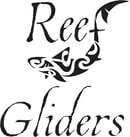The 'El Águila' Wreck
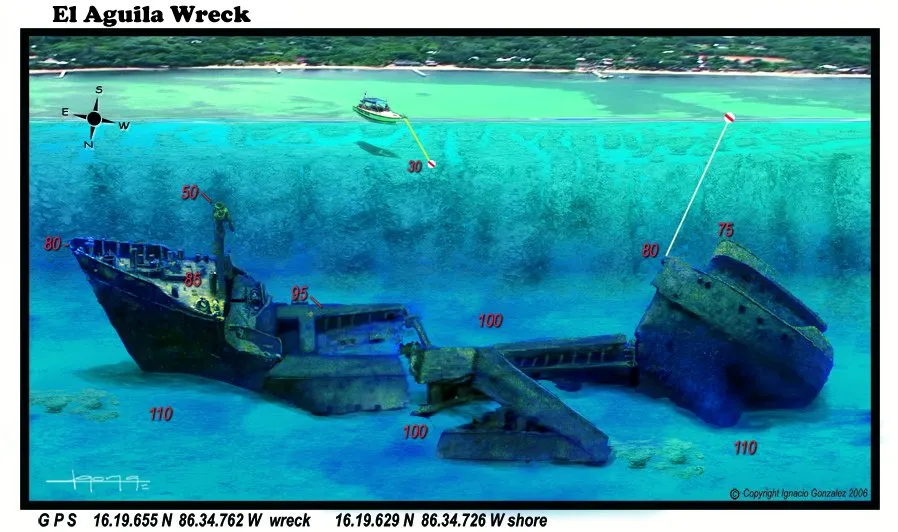
What is it like to dive Roatan's most popular wreck? All you need to know about 'El Águila' Wreck
Diving 'El Águila' wreck in Roatan
The most popular wreck dive off the coast of Roatan is without question the El Águila (The Eagle) and it is easy to see why. The El Águila is a 200 foot cargo ship that was purposefully sunk in 1997 due to growing diver interest in wrecks. She was positioned close to the reef at about 110 feet. However, a couple of weeks later, Hurricane Mitch came along and split the wreck into three distinct pieces and that is how she remains today at a 45 degree angle.
The Descent
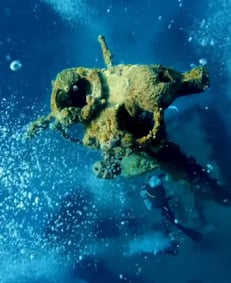 Like most dive sites in Roatan, El Águila is a quick ride from Reef Gliders on our boats. Since it is so popular you can expect to see other divers, but the wreck is big enough to allow for multiple groups to be there at the same time. As you start to descend down the mooring line, the excitement and anticipation of viewing the wreck start to peak until you become totally distracted by the friendly groupers and parrotfish. These fish call the El Águila home and do their part to greet you as soon as you arrive. Once you take your eyes off the welcoming crew, you see the El Águila come into focus. Keep your eyes peeled to the sand to see all the amazing garden eels that live there. You will need your Deep Adventure dive or Advanced Open Water certification to dive here.
Like most dive sites in Roatan, El Águila is a quick ride from Reef Gliders on our boats. Since it is so popular you can expect to see other divers, but the wreck is big enough to allow for multiple groups to be there at the same time. As you start to descend down the mooring line, the excitement and anticipation of viewing the wreck start to peak until you become totally distracted by the friendly groupers and parrotfish. These fish call the El Águila home and do their part to greet you as soon as you arrive. Once you take your eyes off the welcoming crew, you see the El Águila come into focus. Keep your eyes peeled to the sand to see all the amazing garden eels that live there. You will need your Deep Adventure dive or Advanced Open Water certification to dive here.
Wreck sections
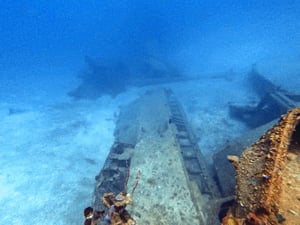 The mooring line is attached to the ships' stern which is full of “windows” to gaze through. The inside of the ship looks inviting and will definitely arouse your interest in taking the Wreck Specialty course. You will be in awe of the size of this ship and the creatures that call it home. The ship's mid section is quite broken up in pieces and it is here where you can spot all kinds of macro critters. When you get to the bow of the ship there are portholes to explore, full of resident arrow crabs and bearded fire worms. If you are lucky you might run into the big green moray eel that claims that part of the wreck. You can also check out the mast of the ship which goes up all the way to 50 feet and is covered in growth.
The mooring line is attached to the ships' stern which is full of “windows” to gaze through. The inside of the ship looks inviting and will definitely arouse your interest in taking the Wreck Specialty course. You will be in awe of the size of this ship and the creatures that call it home. The ship's mid section is quite broken up in pieces and it is here where you can spot all kinds of macro critters. When you get to the bow of the ship there are portholes to explore, full of resident arrow crabs and bearded fire worms. If you are lucky you might run into the big green moray eel that claims that part of the wreck. You can also check out the mast of the ship which goes up all the way to 50 feet and is covered in growth.
Ending the Dive
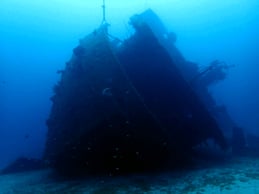 Due to the wreck's proximity to the reef wall, you are able to swim over and continue the remainder of the dive drifting along the wall. Here you will find so much diversity of fish life and different topographies. At 15ft of depth to the southwest of the wall you can find an entrance to a cavern where Glassy eyed sweepers hang out. There are schools of Creole wrasse, brown chromis, yellow tail snappers, chubs and more. The shallows are truly amazing! As you do your safety stop you can gaze at blennies, damselfish, and lettuce sea slugs.
Due to the wreck's proximity to the reef wall, you are able to swim over and continue the remainder of the dive drifting along the wall. Here you will find so much diversity of fish life and different topographies. At 15ft of depth to the southwest of the wall you can find an entrance to a cavern where Glassy eyed sweepers hang out. There are schools of Creole wrasse, brown chromis, yellow tail snappers, chubs and more. The shallows are truly amazing! As you do your safety stop you can gaze at blennies, damselfish, and lettuce sea slugs.
Please remember that wrecks and caverns should only be entered by experienced divers that possess the appropriate specialty certification.
Picture credits: Ignacio Gonzalez, Luke Sabine, Irma Korb
